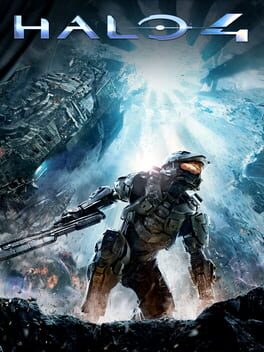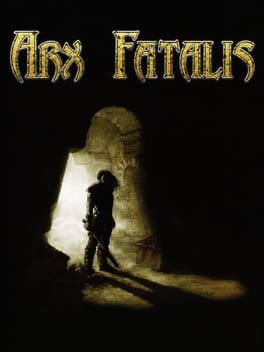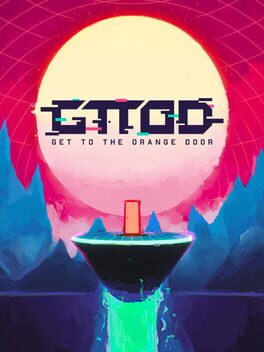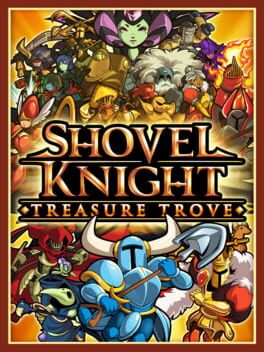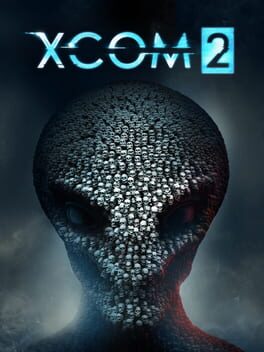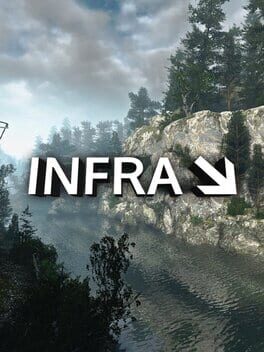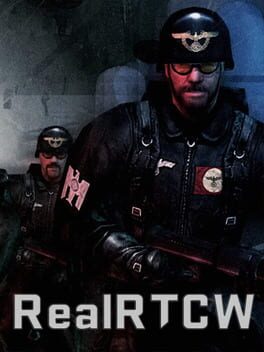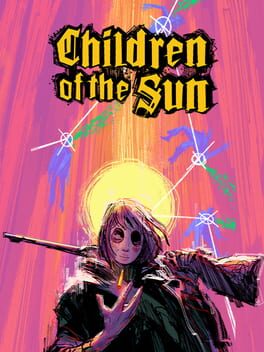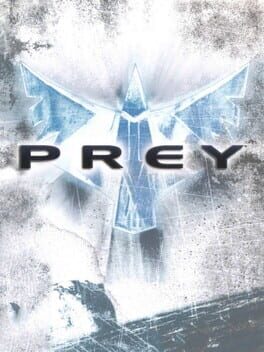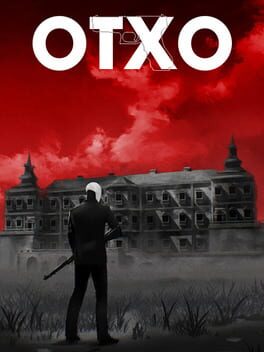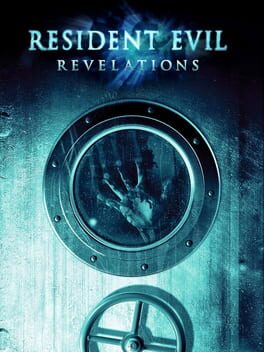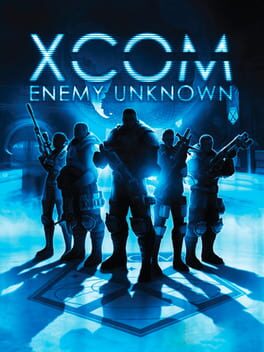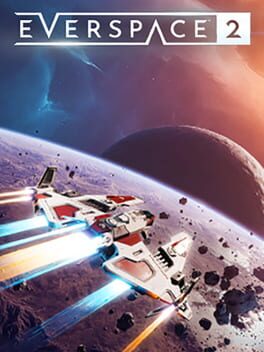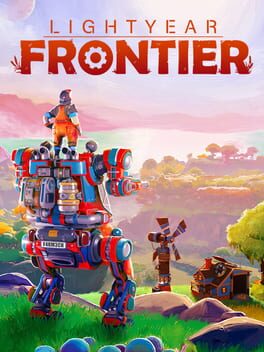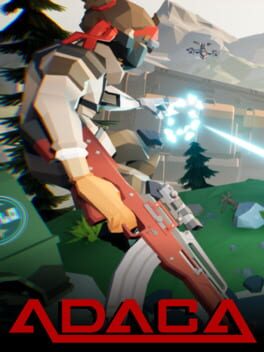ShawnRazor
BACKER
2012
I last played this game back when I was 12 and didn't understand a lot of the hate for it. Since I've changed my opinion on a lot of things since then, I figured I'd jump back in and see if I was just naive or if I truly just stood apart from everyone else. Having finished the campaign again, yeah I was definitely just naive.
That's not to say Halo 4 doesn't get some things right. The game still looks very good for a 2012 game, even if the classic distant environment jpegs of the era are still present. It also manages to tell a solid overarching story, one that's successfully a lot more personal than previous entries in the franchise. It's even got some sequences toward the end that properly stand out.
However, the rest of the experience is notably disjointed, resulting in at best mediocre execution. Most notably was the new Promethean faction. While the enemies introduced aren't bad and offer a nice challenge compared to the Covenant, the weapons they offer are almost entirely reskins of other weapons. The Lightrifle is a Covenant Carbine, the Scattershot is the Shotgun, the Boltshot is a worse Plasma Pistol. The list goes on. It feels more like a cool new set of weapon skins than their own thing.
Some plot choices are left full of holes too. The Covenant being at Requiem is a mystery from the beginning, and even Chief and Cortana question it at the beginning. However, it's never explained more than a long-winded version of "because they are". Alongside that, the Didact just isn't an interesting antagonist. His backstory and motives are explained way better by another person than the Didact himself, and even that wasn't a great explanation.
The whole thing just reeks of another studio attempting to replicate one of the most well-known game series of all time. It is exactly that, but so little is done to mask that. There's rarely anything surprising beyond the final quarter of the game, and the pacing is all over the place. You're either going through a very slow mission that wants to make out with the Rule of Three, or you're going from story moment to intense firefight in the period of a single black screen.
I do think Halo 4 is worth playing in the end since the story between Master Chief and Cortana is worth experiencing, and that last quarter of the game is pretty enjoyable. However, it's one of the least enjoyable Halo games only beaten by Halo 5. Shame my opinion on the game has soured so much, but thus is the nature of replaying games a decade later.
That's not to say Halo 4 doesn't get some things right. The game still looks very good for a 2012 game, even if the classic distant environment jpegs of the era are still present. It also manages to tell a solid overarching story, one that's successfully a lot more personal than previous entries in the franchise. It's even got some sequences toward the end that properly stand out.
However, the rest of the experience is notably disjointed, resulting in at best mediocre execution. Most notably was the new Promethean faction. While the enemies introduced aren't bad and offer a nice challenge compared to the Covenant, the weapons they offer are almost entirely reskins of other weapons. The Lightrifle is a Covenant Carbine, the Scattershot is the Shotgun, the Boltshot is a worse Plasma Pistol. The list goes on. It feels more like a cool new set of weapon skins than their own thing.
Some plot choices are left full of holes too. The Covenant being at Requiem is a mystery from the beginning, and even Chief and Cortana question it at the beginning. However, it's never explained more than a long-winded version of "because they are". Alongside that, the Didact just isn't an interesting antagonist. His backstory and motives are explained way better by another person than the Didact himself, and even that wasn't a great explanation.
The whole thing just reeks of another studio attempting to replicate one of the most well-known game series of all time. It is exactly that, but so little is done to mask that. There's rarely anything surprising beyond the final quarter of the game, and the pacing is all over the place. You're either going through a very slow mission that wants to make out with the Rule of Three, or you're going from story moment to intense firefight in the period of a single black screen.
I do think Halo 4 is worth playing in the end since the story between Master Chief and Cortana is worth experiencing, and that last quarter of the game is pretty enjoyable. However, it's one of the least enjoyable Halo games only beaten by Halo 5. Shame my opinion on the game has soured so much, but thus is the nature of replaying games a decade later.
2002
Arx Fatalis is very much a relic of its time. A game that was made back when games were arguably much more willing to take creative risks to create a unique setting. It's the type of game that, even from a studio like Arkane, you probably wouldn't see. However, it being a relic of its time means that it comes with some drawbacks that are at their best jarring, and at their worst infuriating.
Arx's strongest aspect by far is the atmosphere it invokes. I always love living underground in sandbox games where it allows me to, so an entirely underground civilization is right up my alley. The artistic direction and sound design (barring some awkward transitions and harsher sounds) accentuates this beautifully, as does some of the humor the game pulls in the first half.
I also found the rather clunky combat growing on me over time. It's very slow nad methodical, but it was nice using that slower combat to weave in spells once I got more of them unlocked. Even the spell system is unique, drawing out combos of shapes to cast spells. If I do return to Arx at some point, a spell-based build is an absolute must for me.
However, these strengths are beset by some hefty negatives. The biggest issue by far was with Arx's infatuation with making things obscure. I can handle having to find some things out and puzzle solve without too much guidance, and I'll fully admit there's stuff I looked up that I probably should've pieced together. However, I can't imagine playing this game without several walkthroughs showing me how to do x, y, and z. Hell, I went through half the game completely misunderstanding the heavy attack system since it doesn't teach you.
Some of this can be explained by early PC games having manuals, but the way you progress the main quest can be unnecessarily vague and require random bits and bobs. It could be a pickaxe from a specific level here, or a specific spell there. It drew the runtime out immensely to where I eventually started noclipping through walls at times just so I could skip some parts of the busywork. One part was even necessary when one of the objectives just didn't spawn in.
The story also isn't anything to write home about. It's fairly bog standard for its time, and has plenty of exposition dumps for you to immediately forget. If you skip through most cutscenes then you should be fine, but it can be pretty tiring if you care a lot about lore like me.
I think Arx will jump comfortably in that pile of games that aren't bad, but could go so, so much further with a modern-day remake. Keeping that art direction and combat similar while not being so up its own ass with obscurity would go a lot way, as would making the main plot a little more intriguing. If you can appreciate an atmospheric RPG, and especially if you have Game Pass, this is still worth checking out.
Arx's strongest aspect by far is the atmosphere it invokes. I always love living underground in sandbox games where it allows me to, so an entirely underground civilization is right up my alley. The artistic direction and sound design (barring some awkward transitions and harsher sounds) accentuates this beautifully, as does some of the humor the game pulls in the first half.
I also found the rather clunky combat growing on me over time. It's very slow nad methodical, but it was nice using that slower combat to weave in spells once I got more of them unlocked. Even the spell system is unique, drawing out combos of shapes to cast spells. If I do return to Arx at some point, a spell-based build is an absolute must for me.
However, these strengths are beset by some hefty negatives. The biggest issue by far was with Arx's infatuation with making things obscure. I can handle having to find some things out and puzzle solve without too much guidance, and I'll fully admit there's stuff I looked up that I probably should've pieced together. However, I can't imagine playing this game without several walkthroughs showing me how to do x, y, and z. Hell, I went through half the game completely misunderstanding the heavy attack system since it doesn't teach you.
Some of this can be explained by early PC games having manuals, but the way you progress the main quest can be unnecessarily vague and require random bits and bobs. It could be a pickaxe from a specific level here, or a specific spell there. It drew the runtime out immensely to where I eventually started noclipping through walls at times just so I could skip some parts of the busywork. One part was even necessary when one of the objectives just didn't spawn in.
The story also isn't anything to write home about. It's fairly bog standard for its time, and has plenty of exposition dumps for you to immediately forget. If you skip through most cutscenes then you should be fine, but it can be pretty tiring if you care a lot about lore like me.
I think Arx will jump comfortably in that pile of games that aren't bad, but could go so, so much further with a modern-day remake. Keeping that art direction and combat similar while not being so up its own ass with obscurity would go a lot way, as would making the main plot a little more intriguing. If you can appreciate an atmospheric RPG, and especially if you have Game Pass, this is still worth checking out.
After playing a few hours of Get to the Orange Door and completing a run (at least with the 2/3 of a run currently available) I thought to myself "this feels great already and I'm excited to see what they'll add through the rest of Early Access and in the full release".
Only GTTOD has been in Early Access for almost five years now, and the next update will be the full release version of the game.
It's such a shame because at its core, there's a great experience in GTTOD. It's got that fast-paced fluid movement that I absolutely adore in shooters, its weapons feel great and accurately impactful, its striking neon visuals are pleasing to the eye, and its music (especially in the latter part of the experience) is great. It's everything that surrounds that that's half-baked.
GTTOD's runs suffer from a lack of variety that quickly causes its enjoyment to dry up. It has a simple formula of visiting two expansive locations, following that up with a boss, rinse and repeat. Side objectives are the same small handful though, and once you've visited them on your first and second run, you may as well have visited them all. This isn't helped by a small selection of perks and curses, with many of these having niche applications. The only other side path leads to a "build a bang" machine, which is only worth visiting once in a while. Thankfully the weapon selection doesn't suffer from the same fate, though how you get these weapons certainly can.
The game also suffers from not understanding when the player needs to be reigned in and have their power level tested. My final run before writing this review saw me complete two loops consecutively while only rarely taking a scratch. It was only once I got a curse that essentially made me a one-hit kill that the run was finally ended. It's fun at first since it's like you're on a power trip but quickly dulls when any sense of challenge is removed.
The icing on the cake is how much of the hub is locked behind roguelite progression that makes it almost useless to explore for the first little while. Once you get enough Jade Vines to level some of your stats (furthering that power trip, may I add) it does have a little more use, but not much.
It's a weird dichotomy since on one hand, GTTOD feels like the type of game that fits the fast-paced roguelike first-person shooter genre like a glove, yet feels like much of the roguelike aspects are tacked on. As a result, it's comfortably in that pile of roguelikes that you have fun with for a couple of hours, but ultimately drop once the initial enjoyment fades. I might spend a bit more time with it, especially once it heads into the full release, but I'm less than optimistic one update is going to fix many of the game's glaring flaws.
P.S. I would normally withhold a score till I play the full release, but given how close we are, I'm attaching the 3/5 stars for now. If in a shocking twist the game is drastically different in one update, I'll modify my score accordingly.
Only GTTOD has been in Early Access for almost five years now, and the next update will be the full release version of the game.
It's such a shame because at its core, there's a great experience in GTTOD. It's got that fast-paced fluid movement that I absolutely adore in shooters, its weapons feel great and accurately impactful, its striking neon visuals are pleasing to the eye, and its music (especially in the latter part of the experience) is great. It's everything that surrounds that that's half-baked.
GTTOD's runs suffer from a lack of variety that quickly causes its enjoyment to dry up. It has a simple formula of visiting two expansive locations, following that up with a boss, rinse and repeat. Side objectives are the same small handful though, and once you've visited them on your first and second run, you may as well have visited them all. This isn't helped by a small selection of perks and curses, with many of these having niche applications. The only other side path leads to a "build a bang" machine, which is only worth visiting once in a while. Thankfully the weapon selection doesn't suffer from the same fate, though how you get these weapons certainly can.
The game also suffers from not understanding when the player needs to be reigned in and have their power level tested. My final run before writing this review saw me complete two loops consecutively while only rarely taking a scratch. It was only once I got a curse that essentially made me a one-hit kill that the run was finally ended. It's fun at first since it's like you're on a power trip but quickly dulls when any sense of challenge is removed.
The icing on the cake is how much of the hub is locked behind roguelite progression that makes it almost useless to explore for the first little while. Once you get enough Jade Vines to level some of your stats (furthering that power trip, may I add) it does have a little more use, but not much.
It's a weird dichotomy since on one hand, GTTOD feels like the type of game that fits the fast-paced roguelike first-person shooter genre like a glove, yet feels like much of the roguelike aspects are tacked on. As a result, it's comfortably in that pile of roguelikes that you have fun with for a couple of hours, but ultimately drop once the initial enjoyment fades. I might spend a bit more time with it, especially once it heads into the full release, but I'm less than optimistic one update is going to fix many of the game's glaring flaws.
P.S. I would normally withhold a score till I play the full release, but given how close we are, I'm attaching the 3/5 stars for now. If in a shocking twist the game is drastically different in one update, I'll modify my score accordingly.
I was genuinely surprised by just how much I enjoyed Treasure Trove, having never touched the Shovel Knight franchise before. I'm not super big on 2D platformers yet I found myself consistently returning to beat a couple more levels.
The biggest reason for my enjoyment easily comes with how unique the whole package is. Each of the four games included is quite unique in how their main character performs, with Plague Knight in Plague of Shadows being a particular highlight. You have to retool how you approach each experience, and it's ironically better for it.
Even beyond the broader freshness, each level in each of the four games feels distinct, with unique soundtracks, varied enemies, and tons of different environmental hazards to navigate. It makes each game quite memorable, even when the fourth game, King of Cards, splits single locations into multiple levels.
It's all wrapped in this labor of love that shows just how much Yacht Club cared about their brainchild. The humor is spot-on, the music is full of bangers, and the visuals all feel distinct and pleasing. It oozes passion, making it almost hard to put down.
However, there is one thing holding the package back, being the inconsistencies across each experience. Shovel of Hope is great on its own, but pales in uniqueness to the rest of the package. Plague of Shadows reuses levels and makes them a touch tiring (something remedied by the final two games). Specter of Torment feels piss easy thanks to overloading you with powerful abilities and moves, and King of Cards often feels like a challenge mode that I wasn't asking for. I also didn't love Joustous, but I attribute that more to me not adoring card games online than any issue with the card game itself.
However, each inversely came with strengths over the others. Shovel of Hope makes for a great introduction for its simplicity. Plague of Shadows has the most diverse equipment loadout in the entire collection, Specter of Torment has the most fluid movement, and King of Cards has the best humor.
If you're a fan of 2D platformers or can at least tolerate it, there's a ton to love in Treasure Trove. Its got over 20 hours of content for main story completers like me to explore, and hundreds more hours for completionists. It's a package brimming with content and passion, and one I don't regret playing through fully. I'm almost surprised only 5% of people finished up to the last game, at least on Steam.
The biggest reason for my enjoyment easily comes with how unique the whole package is. Each of the four games included is quite unique in how their main character performs, with Plague Knight in Plague of Shadows being a particular highlight. You have to retool how you approach each experience, and it's ironically better for it.
Even beyond the broader freshness, each level in each of the four games feels distinct, with unique soundtracks, varied enemies, and tons of different environmental hazards to navigate. It makes each game quite memorable, even when the fourth game, King of Cards, splits single locations into multiple levels.
It's all wrapped in this labor of love that shows just how much Yacht Club cared about their brainchild. The humor is spot-on, the music is full of bangers, and the visuals all feel distinct and pleasing. It oozes passion, making it almost hard to put down.
However, there is one thing holding the package back, being the inconsistencies across each experience. Shovel of Hope is great on its own, but pales in uniqueness to the rest of the package. Plague of Shadows reuses levels and makes them a touch tiring (something remedied by the final two games). Specter of Torment feels piss easy thanks to overloading you with powerful abilities and moves, and King of Cards often feels like a challenge mode that I wasn't asking for. I also didn't love Joustous, but I attribute that more to me not adoring card games online than any issue with the card game itself.
However, each inversely came with strengths over the others. Shovel of Hope makes for a great introduction for its simplicity. Plague of Shadows has the most diverse equipment loadout in the entire collection, Specter of Torment has the most fluid movement, and King of Cards has the best humor.
If you're a fan of 2D platformers or can at least tolerate it, there's a ton to love in Treasure Trove. Its got over 20 hours of content for main story completers like me to explore, and hundreds more hours for completionists. It's a package brimming with content and passion, and one I don't regret playing through fully. I'm almost surprised only 5% of people finished up to the last game, at least on Steam.
2016
Like XCOM: Enemy Unknown, the first 10 hours of XCOM 2 were brutal. I had barely anything to work with, a constant barrage of problems to solve, and soldiers that died left and right. It was a real power struggle, and one that made me frustrated quite consistently. Unlike EU though, once I was over that hurdle, it wasn't entirely a walk in the park from then on out. Still easier, sure, but it maintained a stable level of challenge that didn't extinguish even going into the finale.
XCOM 2 continues the series tradition of balancing that fine line between accessibility and complexity, while adding plenty more mechanics in to further deepen strategy. New tools have been brought in to alleviate some of Enemy Unknown's problems. One big example of this is through methods of scanning ahead for targets, which fixes the major issue of feeling like you've screwed yourself because you moved one of your units slightly too early. There's also more depth to each character, with various attachments to lightly buff their weapons, installable upgrades, and more.
Speaking on characters, the personality that made Enemy Unknown as good as it is has received far more attention with tons more ways to customize your character. You can even write backstories for them if you're really into it. Combined with what I hear is more interactivity between units in War of the Chosen, and it's a storyteller's dream. I made many of my friends in the game and it was fun seeing some survive, while others saw their stories brought to a sad end (including one on the final mission).
All of this is combined with some heavily increased variety which was sorely needed. Missions are much more diverse (I can count the amount of repeated missions I ran on one hand), enemies are more numerous and unique both in design and in challenges they present, and surprises are far more plentiful.
These aren't even touching on some of the minor improvements. You can load a past save while the enemy is still taking their turn (thank god), more diverse equipment can be researched, the base building mechanics have been tightened up, the geoscape is far more interesting. The list goes on.
The only issue I can genuinely hold against this game is the time some turns and actions can take. It isn't obnoxious, but I've had moments where enemy turns can feel like they take way longer than they need to, even with some unnecessary pauses. I can forgive it given everything the game does right, and a mod can easily fix it, but it's still an issue.
Even with that, I don't see any reason to give this game any lower than a 10, and I didn't even play the beloved WotC expansion yet. This is a masterpiece that builds upon the first game's foundations while adding its own flavor on previous mechanics, helping it feel refreshing even after recently playing XCOM EU. It's easy to see why the game has received such endless praise, and it's one I very much plan to revisit down the line with WotC enabled this time. If you're on the fence about turn-based games or simply want one of the best experiences in the genre, this is it.
XCOM 2 continues the series tradition of balancing that fine line between accessibility and complexity, while adding plenty more mechanics in to further deepen strategy. New tools have been brought in to alleviate some of Enemy Unknown's problems. One big example of this is through methods of scanning ahead for targets, which fixes the major issue of feeling like you've screwed yourself because you moved one of your units slightly too early. There's also more depth to each character, with various attachments to lightly buff their weapons, installable upgrades, and more.
Speaking on characters, the personality that made Enemy Unknown as good as it is has received far more attention with tons more ways to customize your character. You can even write backstories for them if you're really into it. Combined with what I hear is more interactivity between units in War of the Chosen, and it's a storyteller's dream. I made many of my friends in the game and it was fun seeing some survive, while others saw their stories brought to a sad end (including one on the final mission).
All of this is combined with some heavily increased variety which was sorely needed. Missions are much more diverse (I can count the amount of repeated missions I ran on one hand), enemies are more numerous and unique both in design and in challenges they present, and surprises are far more plentiful.
These aren't even touching on some of the minor improvements. You can load a past save while the enemy is still taking their turn (thank god), more diverse equipment can be researched, the base building mechanics have been tightened up, the geoscape is far more interesting. The list goes on.
The only issue I can genuinely hold against this game is the time some turns and actions can take. It isn't obnoxious, but I've had moments where enemy turns can feel like they take way longer than they need to, even with some unnecessary pauses. I can forgive it given everything the game does right, and a mod can easily fix it, but it's still an issue.
Even with that, I don't see any reason to give this game any lower than a 10, and I didn't even play the beloved WotC expansion yet. This is a masterpiece that builds upon the first game's foundations while adding its own flavor on previous mechanics, helping it feel refreshing even after recently playing XCOM EU. It's easy to see why the game has received such endless praise, and it's one I very much plan to revisit down the line with WotC enabled this time. If you're on the fence about turn-based games or simply want one of the best experiences in the genre, this is it.
2016
I want to preface what I'm about to say with the fact that if you like puzzle games where you must entirely find the solution yourself without any hints then this is the game for you. There's more than enough of that to spend hours on.
With that being said, those of you who are like me and want some semblance of (video game) logic toward a conclusion in puzzles, Infra is a test of frustration. For the handful of hours I got through this, every puzzle I found was met with a sense of dread and calling it quits for the day.
The way puzzles are structured are fairly straightforward. You walk into a location, are met with infrastructure that's in serious disrepair, and need to fix it to progress. That's all the guidance you get outside of the odd note here and there. As such, puzzles are less about finding the correct solution and more about finding whatever it is the game wants. To me, that process is grating and makes me feel like I'm walking in circles finding that one thing I didn't interact with.
I completely understand why the developer did this. They wanted Infra's puzzles to feel as realistic as possible, at least within the ability to actually complete them. On the front of uniqueness, there's few games with puzzles quite like it. It's just not for me and, judging by the fact 35% of people have gotten just under halfway through the game, it's not for a lot of people.
Though outside of things that could arguably come down to personal tastes, the voice acting for this game is laughably bad. It's mostly due to Finnish voice actors not speaking their native language which isn't the fault of the actors themselves, but it does make any line delivered feel unnaturally wooden. I almost considered swapping the language at times and just reading the subtitles, which is tough since I tend to have a tough time putting subtitles to emotion.
For what it's worth, there are things Infra gets right. Its world is gorgeous and arguably some of the best Source 1 content we've ever gotten. It also has decent music whenever it interjects. For my tastes though, it isn't enough to carry the experience. I really wish I could love this game as much as other people do, but the only way I see myself playing without losing my sanity is to look up all the puzzle solutions. Not super interested in that idea.
With that being said, those of you who are like me and want some semblance of (video game) logic toward a conclusion in puzzles, Infra is a test of frustration. For the handful of hours I got through this, every puzzle I found was met with a sense of dread and calling it quits for the day.
The way puzzles are structured are fairly straightforward. You walk into a location, are met with infrastructure that's in serious disrepair, and need to fix it to progress. That's all the guidance you get outside of the odd note here and there. As such, puzzles are less about finding the correct solution and more about finding whatever it is the game wants. To me, that process is grating and makes me feel like I'm walking in circles finding that one thing I didn't interact with.
I completely understand why the developer did this. They wanted Infra's puzzles to feel as realistic as possible, at least within the ability to actually complete them. On the front of uniqueness, there's few games with puzzles quite like it. It's just not for me and, judging by the fact 35% of people have gotten just under halfway through the game, it's not for a lot of people.
Though outside of things that could arguably come down to personal tastes, the voice acting for this game is laughably bad. It's mostly due to Finnish voice actors not speaking their native language which isn't the fault of the actors themselves, but it does make any line delivered feel unnaturally wooden. I almost considered swapping the language at times and just reading the subtitles, which is tough since I tend to have a tough time putting subtitles to emotion.
For what it's worth, there are things Infra gets right. Its world is gorgeous and arguably some of the best Source 1 content we've ever gotten. It also has decent music whenever it interjects. For my tastes though, it isn't enough to carry the experience. I really wish I could love this game as much as other people do, but the only way I see myself playing without losing my sanity is to look up all the puzzle solutions. Not super interested in that idea.
2020
RTCW is still a great shooter, and RealRTCW is arguably the best way you can play it (even for a first playthrough) in the modern day. It feels less like a community mod and more like a Nightdive Studios-style remaster. A few options you can revert back to their old versions too.
Some of the new weapons added are great, most notably the shotgun which felt absent in the base game. It's not something I used much, but it made the usual frustrating zombie chapters much more enjoyable since it's great for dealing with them. The new pistol and assault rifle/LMG hybrid were great too.
Still do have some of the smaller issues with the game that I did before, such as the final boss being particularly bad along with the blinding ghost enemies being very frustrating. Still, this mod makes changes where it counts along with proper widescreen support. If I do replay RTCW again, this will likely be how I do it.
Some of the new weapons added are great, most notably the shotgun which felt absent in the base game. It's not something I used much, but it made the usual frustrating zombie chapters much more enjoyable since it's great for dealing with them. The new pistol and assault rifle/LMG hybrid were great too.
Still do have some of the smaller issues with the game that I did before, such as the final boss being particularly bad along with the blinding ghost enemies being very frustrating. Still, this mod makes changes where it counts along with proper widescreen support. If I do replay RTCW again, this will likely be how I do it.
2024
When I first started Children of the Sun, I was expecting it to fall into the category of many other games like it. Where it either tried to stretch one idea for way too long or didn't spend enough time exploring its many possibilities. Shockingly that isn't the case here, and it's all the better for it.
You'll probably have the game beat in about 3-4 hours, but that ironically feels like the perfect length. The dev clearly knew not to overextend their reach, getting a good bit of mileage out of the idea with a small handful of mechanics and new things to consider, but never tried to overuse that and pad itself out.
When it's at its best, using its mechanics to full effect, it's a tactician's dream as you mark all targets on the map and pick the best route without finding your bullet drilled in a random bit of metal or the side of a building. Thanks to some solid sound design to top it all off, it's quite satisfying.
Only problems I had relate to the story and one mechanic being a little finicky. The story isn't necessarily bad, but it's told while being so in love with its obscurity that it can be hard to follow at times. As for the mechanic, I'll try not to spoil it but it can be very finicky with what it defines as a killing shot (you'll know what I mean when you see it).
$20 is bordering a bit on what I'm willing to pay for a game of this length, but it's still one of the better Devolver Digital games. If you like puzzle games or the odd shooter, it's a pretty fun time.
You'll probably have the game beat in about 3-4 hours, but that ironically feels like the perfect length. The dev clearly knew not to overextend their reach, getting a good bit of mileage out of the idea with a small handful of mechanics and new things to consider, but never tried to overuse that and pad itself out.
When it's at its best, using its mechanics to full effect, it's a tactician's dream as you mark all targets on the map and pick the best route without finding your bullet drilled in a random bit of metal or the side of a building. Thanks to some solid sound design to top it all off, it's quite satisfying.
Only problems I had relate to the story and one mechanic being a little finicky. The story isn't necessarily bad, but it's told while being so in love with its obscurity that it can be hard to follow at times. As for the mechanic, I'll try not to spoil it but it can be very finicky with what it defines as a killing shot (you'll know what I mean when you see it).
$20 is bordering a bit on what I'm willing to pay for a game of this length, but it's still one of the better Devolver Digital games. If you like puzzle games or the odd shooter, it's a pretty fun time.
2006
I remember having stark memories of watching my dad play this when I was a kid (even if I probably shouldn't have been watching this as a kid) and thought I'd check it out to see what it was like. I'll be damned cause for a 2006 game, Prey was ahead of its time.
For the first half of the game, it was just surprise after surprise as the game introduced various new mechanics and showed off some sick tricks. Seamless portals (albeit static ones) were there a year before Portal would popularize them, along with some great gravity-shifting traversal that adds some great dynamics to your standard shooter fare.
I was equally impressed by the small yet unique set of weapons, all serving a reskin of the standard shooter fare but with enough alien to them to help set them apart. These weapons hitting hard and sounding great only add to it.
And to top it off, it makes use of its engine's signature atmosphere, showcasing the bioengineered nature of the Sphere beautifully. Its texture detail may not hold up perfectly 18 years later, but the visuals at a glance hold up super well in contrast. Combine that with some great music, and it's a really solid experience.
However, there are a few things that hold it back. While I don't agree that the story is terrible, I do find it just sufficient rather than anything more. There isn't a lot of story content for a good portion of the game, and some of the antagonists aren't the most compellingly written. It's enough, but barely. The game also suffers from some weaker boss encounters, though none are particularly annoying.
Overall, still very impressed with how well this holds up. If you get the chance to play it and don't mind a mediocre story, there's truly something special here.
For the first half of the game, it was just surprise after surprise as the game introduced various new mechanics and showed off some sick tricks. Seamless portals (albeit static ones) were there a year before Portal would popularize them, along with some great gravity-shifting traversal that adds some great dynamics to your standard shooter fare.
I was equally impressed by the small yet unique set of weapons, all serving a reskin of the standard shooter fare but with enough alien to them to help set them apart. These weapons hitting hard and sounding great only add to it.
And to top it off, it makes use of its engine's signature atmosphere, showcasing the bioengineered nature of the Sphere beautifully. Its texture detail may not hold up perfectly 18 years later, but the visuals at a glance hold up super well in contrast. Combine that with some great music, and it's a really solid experience.
However, there are a few things that hold it back. While I don't agree that the story is terrible, I do find it just sufficient rather than anything more. There isn't a lot of story content for a good portion of the game, and some of the antagonists aren't the most compellingly written. It's enough, but barely. The game also suffers from some weaker boss encounters, though none are particularly annoying.
Overall, still very impressed with how well this holds up. If you get the chance to play it and don't mind a mediocre story, there's truly something special here.
2023
OTXO has joined the exclusive camp of roguelikes alongside Enter the Gungeon for me as something I ultimately enjoyed and will likely play on and off, but may never finish. Part of that comes down to the fact that I suck at both, but also cause both have some similar issues that hold me back from getting addicted to them.
In the case of OTXO, its moment-to-moment gameplay is pure perfection. Its weapons are sleek and feel weighty, with a welcome punch to each shot hitting their target. Its movement is also fluid, thanks in part to a well done slowdown mechanic. When you're in the thick of it and clearing room after room, only to barely clear a level with one HP, it's exhilarating.
It's the reason I put around 10 hours or so into it in the first place despite the lack of that "one more run" feeling these games are known for. I love my gameplay being superb, and OTXO does that beautifully. However, the roguelike mechanics it runs with don't hold up quite as well.
Namely, the repetitiveness of roguelikes is REALLY felt here. Level order can change a bit along with layout, but once you've played a handful of runs, you know almost exactly what to expect. Since knowledge doesn't speed things up quite as much as I'd like, it can make getting through those earlier levels a slog. Especially when the passive selection is severely lacking.
The drip feed of new passives and guns is also lacking, even if a great idea in theory. Having to choose between getting new equipment to persist between runs or purchasing more passives you've already unlocked does give reasons to do different things while playing. Given how many of these can be useless outside of specific builds though, it can make the choice of going with what you already have unlocked all the more appealing. The guns are much less of an issue, but passives like bonuses for standing still in a game about being fast just feel silly.
To top it all off, certain builds are also severely damaged by the game's systems. For example, I wanted to try a Kunai build one time just for shits and giggles, and while it was fun to start the run off, you can't enter a boss room with a Kunai. That, combined with the fact bosses are hard to beat with the Kunai, made builds like that damn near unviable. The array of guns you need to pick up doesn't aid this either.
In the end, I still got a lot of enjoyment out of OTXO. When it wants to be a top-down shooter with visceral action, it does all that and more. When it wants to be a roguelike, however, it disappoints in several key areas. While I will likely return to this on occasion, I can't imagine this score will change much.
In the case of OTXO, its moment-to-moment gameplay is pure perfection. Its weapons are sleek and feel weighty, with a welcome punch to each shot hitting their target. Its movement is also fluid, thanks in part to a well done slowdown mechanic. When you're in the thick of it and clearing room after room, only to barely clear a level with one HP, it's exhilarating.
It's the reason I put around 10 hours or so into it in the first place despite the lack of that "one more run" feeling these games are known for. I love my gameplay being superb, and OTXO does that beautifully. However, the roguelike mechanics it runs with don't hold up quite as well.
Namely, the repetitiveness of roguelikes is REALLY felt here. Level order can change a bit along with layout, but once you've played a handful of runs, you know almost exactly what to expect. Since knowledge doesn't speed things up quite as much as I'd like, it can make getting through those earlier levels a slog. Especially when the passive selection is severely lacking.
The drip feed of new passives and guns is also lacking, even if a great idea in theory. Having to choose between getting new equipment to persist between runs or purchasing more passives you've already unlocked does give reasons to do different things while playing. Given how many of these can be useless outside of specific builds though, it can make the choice of going with what you already have unlocked all the more appealing. The guns are much less of an issue, but passives like bonuses for standing still in a game about being fast just feel silly.
To top it all off, certain builds are also severely damaged by the game's systems. For example, I wanted to try a Kunai build one time just for shits and giggles, and while it was fun to start the run off, you can't enter a boss room with a Kunai. That, combined with the fact bosses are hard to beat with the Kunai, made builds like that damn near unviable. The array of guns you need to pick up doesn't aid this either.
In the end, I still got a lot of enjoyment out of OTXO. When it wants to be a top-down shooter with visceral action, it does all that and more. When it wants to be a roguelike, however, it disappoints in several key areas. While I will likely return to this on occasion, I can't imagine this score will change much.
While playing through Resident Evil Revelations, I was often reminded of playing RE3 Remake in that it felt often like a game in the RE universe, but made by people who either wanted to do their own thing or simply didn't understand the appeal of the franchise. However, unlike RE3, I found myself not really having fun with it even on its own terms.
Part of the game being starkly different stems from the game being a 3DS game first and foremost and I can understand that, even if it being sold on Steam does open itself up to scrutiny. However, there's a lot that simply can't be faulted to the 3DS' capabilities.
First being its story, which is beyond ludicrous. Now I get it, I've played enough Resident Evil games to know that you need to suspend your disbelief frequently. It's simply how these games function. However, the level of sheer silliness in some of the plot directions and character designs is almost laughable. Most characters in this game outside of Chris are extremely horny with comments out of the blue, and jokes that simply haven't aged too well. Sure, weird guy wanting to sleep with how woman is funny the first time, but not when it's then used for most of the game's comedic relief. Eventually it just gets grating.
Then there's the gameplay flow. I'll give the team the benefit of the doubt and say that the aim controls are due to it being a DS game first and foremost, but the way fights are designed can't be as easily excused. Nearly every enemy in the game is as simple as "shoot it till it's dead" and that works just about every time. That, combined with a ton of boring horde fights and some bullet sponge enemies, makes the RE3 Remake comparisons almost learn in its favor over Revelations.
Topping it all off is how the few things the game introduces end up quickly falling flat. The scan system for example rarely feels useful and is quite cumbersome to use in the first place. You get a healing item every time you scan enough enemies which is cool and all, but you rarely need it and it takes a surprising amount of time to do. The weapon parts system feels mostly underutilized too. Both of these systems I ultimately stopped bothering with about halfway through, and it made me have a slightly better time.
There are still merits to RE Revelations. It's more RE if you were really hungering for more RE, and some of the classic conventions are there. However, looking at it from the lens of the series, this is ultimately one of the weakest entries. Not because of frustration since it's rarely if ever angering, but more cause it's just plain boring. Likely will forget this in a week.
Part of the game being starkly different stems from the game being a 3DS game first and foremost and I can understand that, even if it being sold on Steam does open itself up to scrutiny. However, there's a lot that simply can't be faulted to the 3DS' capabilities.
First being its story, which is beyond ludicrous. Now I get it, I've played enough Resident Evil games to know that you need to suspend your disbelief frequently. It's simply how these games function. However, the level of sheer silliness in some of the plot directions and character designs is almost laughable. Most characters in this game outside of Chris are extremely horny with comments out of the blue, and jokes that simply haven't aged too well. Sure, weird guy wanting to sleep with how woman is funny the first time, but not when it's then used for most of the game's comedic relief. Eventually it just gets grating.
Then there's the gameplay flow. I'll give the team the benefit of the doubt and say that the aim controls are due to it being a DS game first and foremost, but the way fights are designed can't be as easily excused. Nearly every enemy in the game is as simple as "shoot it till it's dead" and that works just about every time. That, combined with a ton of boring horde fights and some bullet sponge enemies, makes the RE3 Remake comparisons almost learn in its favor over Revelations.
Topping it all off is how the few things the game introduces end up quickly falling flat. The scan system for example rarely feels useful and is quite cumbersome to use in the first place. You get a healing item every time you scan enough enemies which is cool and all, but you rarely need it and it takes a surprising amount of time to do. The weapon parts system feels mostly underutilized too. Both of these systems I ultimately stopped bothering with about halfway through, and it made me have a slightly better time.
There are still merits to RE Revelations. It's more RE if you were really hungering for more RE, and some of the classic conventions are there. However, looking at it from the lens of the series, this is ultimately one of the weakest entries. Not because of frustration since it's rarely if ever angering, but more cause it's just plain boring. Likely will forget this in a week.
2012
While I'm not typically a fan of turn-based games, I thought I'd give the XCOM series a go since so many people have said it's great, and about 20 hours and a complete campaign later, yeah I think I see why.
By far the greatest strength of XCOM EU is the personality given to your characters. I would stream this in Discord calls every once in a while and had my friends create soldiers, which led to some laughs and sadness when one would land a lot of shots in quick succession or proceed to die. Besides my personal soldier, one of them even ended up being the "hero" of the story who decimated everything in her way. I knew the character storytelling was interesting before playing, but I didn't expect to become that attached to characters that frankly don't have much to say.
The gameplay systems also add a lot to the experience, particularly outside of individual battles. Having to choose between certain countries to protect while others collapse and stop supporting XCOM was great, since it never felt like a choice was particularly easy. Combined with researching and purchasing upgrades for soldiers, managing a pretty tight economy, and building up the base, and the sense of progression is great.
Only have some minor gripes with the game that hold it back from being a masterpiece. Namely, that you can't either pause during or fast forward an enemy turn. The amount of times a turn started with something that made me want to load a save, only to have to watch the other five aliens on the field necessitate that loaded save even harder, can be really annoying. Also the odd bug here and there, including some that made me close and relaunch the game itself.
But yeah, I'm really happy with the 20 hours I sunk into this game. It isn't too long, has plenty of strategy, and feels rife with personality. Will totally be checking out XCOM 2 at some point soon.
P.S. Found out after I finished the main game that Enemy Within is the same game but with added features. I only feel slightly stupid
By far the greatest strength of XCOM EU is the personality given to your characters. I would stream this in Discord calls every once in a while and had my friends create soldiers, which led to some laughs and sadness when one would land a lot of shots in quick succession or proceed to die. Besides my personal soldier, one of them even ended up being the "hero" of the story who decimated everything in her way. I knew the character storytelling was interesting before playing, but I didn't expect to become that attached to characters that frankly don't have much to say.
The gameplay systems also add a lot to the experience, particularly outside of individual battles. Having to choose between certain countries to protect while others collapse and stop supporting XCOM was great, since it never felt like a choice was particularly easy. Combined with researching and purchasing upgrades for soldiers, managing a pretty tight economy, and building up the base, and the sense of progression is great.
Only have some minor gripes with the game that hold it back from being a masterpiece. Namely, that you can't either pause during or fast forward an enemy turn. The amount of times a turn started with something that made me want to load a save, only to have to watch the other five aliens on the field necessitate that loaded save even harder, can be really annoying. Also the odd bug here and there, including some that made me close and relaunch the game itself.
But yeah, I'm really happy with the 20 hours I sunk into this game. It isn't too long, has plenty of strategy, and feels rife with personality. Will totally be checking out XCOM 2 at some point soon.
P.S. Found out after I finished the main game that Enemy Within is the same game but with added features. I only feel slightly stupid
2021
When I bailed on Everspace 1, I remember saying that it felt like a great game trapped in the confines of a roguelike that it just didn't belong in. While I do think I was correct in that since I have several times as many hours in Everspace 2 as I do in the first game, neither game managed to hold my interest for long enough to see it through.
The main crux of the issue for me has to be how, similar to ES1, ES2 seems to want to drag itself on much longer than it has any right to. Where ES1 had you dying and retrying to build up incremental stats, ES2 has you grinding to build up individual stats using a handful of different systems. This does freshen things up considerably, but once the initial appeal wears off, you're essentially doing the same thing. It isn't helped by the fact that getting better gear feels less like gaining power, and more like sprinting to keep up with your opponents.
As the Steam reviews show, that has an appeal to some people but not to me. The whole numbers game to me just makes improving your shift devoid of any surprise. Sure, you could argue different weapons and abilities do give some degree of shakeup, but even that doesn't last too long (especially when a lot of the abilities aren't that exciting to get).
It doesn't help that the story is far from anything to write home about. I expected as much after my time with ES1 and it's something I can generally forgive, but when paired with a gameplay loop that doesn't excite me, the lack of interest erodes any reason for me to keep playing. Adam continues to be impossible to connect to, given he can swap between showing compassion and being an ass at the drop of a hat.
Again, I have to give credit where it's due. ES2 did hold my interest for around 20 hours or so this time around and I made it just past the Zharkov system in my time. It's once again a beautiful game, paired with some well-done music (albeit songs that get old quickly) and a combat flow that initially feels great. However, the result for me is still the same.
Only reason I'm putting this on shelved is cause I may come back to see it through at some point. It never frustrated me, just bored me to the point of not wanting to return
The main crux of the issue for me has to be how, similar to ES1, ES2 seems to want to drag itself on much longer than it has any right to. Where ES1 had you dying and retrying to build up incremental stats, ES2 has you grinding to build up individual stats using a handful of different systems. This does freshen things up considerably, but once the initial appeal wears off, you're essentially doing the same thing. It isn't helped by the fact that getting better gear feels less like gaining power, and more like sprinting to keep up with your opponents.
As the Steam reviews show, that has an appeal to some people but not to me. The whole numbers game to me just makes improving your shift devoid of any surprise. Sure, you could argue different weapons and abilities do give some degree of shakeup, but even that doesn't last too long (especially when a lot of the abilities aren't that exciting to get).
It doesn't help that the story is far from anything to write home about. I expected as much after my time with ES1 and it's something I can generally forgive, but when paired with a gameplay loop that doesn't excite me, the lack of interest erodes any reason for me to keep playing. Adam continues to be impossible to connect to, given he can swap between showing compassion and being an ass at the drop of a hat.
Again, I have to give credit where it's due. ES2 did hold my interest for around 20 hours or so this time around and I made it just past the Zharkov system in my time. It's once again a beautiful game, paired with some well-done music (albeit songs that get old quickly) and a combat flow that initially feels great. However, the result for me is still the same.
Only reason I'm putting this on shelved is cause I may come back to see it through at some point. It never frustrated me, just bored me to the point of not wanting to return
2024
Won't be running a score yet since it's in early access, but I will say that while I think Lightyear Frontier is in a strong spot, it definitely feels like one of those games that'll be much more worth approaching once it's fully released.
This is again, less to do with the quality of the game itself and more due to a handful of mechanics that just aren't where they need to be yet. Many of the core mechanics like wildlife and the in-game economy feel more designed for the most dedicated players and don't offer much practical use yet.
However, it also seems promising thanks to a lot of solid quality of life. Chests are based on weight instead of a grid-based storage system (there need to be chests that hold more weight added to the game, however), chores are made much easier as you progress, and the versatility of the mech makes it super helpful.
Lightyear Frontier has the power to stand tall next to other great entries in the genre. It just needs that push to get it there, and I truly believe the developers have the passion to do so. It's just a matter of the developers properly realizing that potential.
This is again, less to do with the quality of the game itself and more due to a handful of mechanics that just aren't where they need to be yet. Many of the core mechanics like wildlife and the in-game economy feel more designed for the most dedicated players and don't offer much practical use yet.
However, it also seems promising thanks to a lot of solid quality of life. Chests are based on weight instead of a grid-based storage system (there need to be chests that hold more weight added to the game, however), chores are made much easier as you progress, and the versatility of the mech makes it super helpful.
Lightyear Frontier has the power to stand tall next to other great entries in the genre. It just needs that push to get it there, and I truly believe the developers have the passion to do so. It's just a matter of the developers properly realizing that potential.
2022
I took a gamble and spent more than I normally would on a game like this, and I'll be honest, Adaca was a pleasant surprise. Not without its faults of course, but for one person to design a game like this, the passion on display is commendable.
By far, Adaca revels in its environments and sheer scale of some areas. While this is something I was pleased to see, I was arguably more impressed by how the game utilized large levels, big fights, explosions, and the sort while maintaining a crisp and stable framerate. Mind you, Adaca isn't far off from Roblox in texture quality, but it's still a welcome level of polish.
It also does quite wonderfully in the weapon selection as well. The sheer amount of weapons in this game can be a touch overwhelming at times, but where the impact of new tools is lost, there's the variety in combat to gain. You'll have favorite weapons of course, but thanks to varying enemy arsenal, you won't stick to two faves quite as often as you would in other games. It's a surprising and welcome shakeup.
There's even a surprising amount of content to boot. Along with the 6 or so hours of content provided by the game's three episodes, you also have the Zone Patrol mode which is more non-linear and open-ended. I haven't dabbled into it too much yet, but it's still a fun distraction from the campaign fare and brings a welcome bit of value. Combined with more than enough secrets, there's a lot of meat for big fans to dissect.
However, this is an imperfect beast in two key areas. The most noticeable of the two is in AI design, which ended up being wildly inconsistent on the game's second highest difficulty, Revolutionary. Sometimes I'd enter an area and see an enemy act like I'm not even there, or an enemy's teammate wouldn't hear me introducing a shotgun round to his buddy's skull. Other times I'd enter an area and have my healthbar disappear. It wasn't too distracting, but there were a good handful of BS deaths I experienced throughout my time.
The other major issue lies with music, of which the issue is variety. 95% of the music choices are purely ambiance which aren't bad for their usage, but never serve to heighten a particular encounter. The only track that properly got me interested was the game's final boss, and even that wasn't a standout.
Even with these faults though, I'm pleasantly surprised by what this single dev managed to pull off with their first project. It's got the fun factor, a smorgasbord of weapons, and varied locations that all sell their spectacle well. I'd love to see how the dev might adapt their creative weapon style to a game that focuses more heavily on it like a roguelike. For now though, I think they have a bright future ahead of them.
By far, Adaca revels in its environments and sheer scale of some areas. While this is something I was pleased to see, I was arguably more impressed by how the game utilized large levels, big fights, explosions, and the sort while maintaining a crisp and stable framerate. Mind you, Adaca isn't far off from Roblox in texture quality, but it's still a welcome level of polish.
It also does quite wonderfully in the weapon selection as well. The sheer amount of weapons in this game can be a touch overwhelming at times, but where the impact of new tools is lost, there's the variety in combat to gain. You'll have favorite weapons of course, but thanks to varying enemy arsenal, you won't stick to two faves quite as often as you would in other games. It's a surprising and welcome shakeup.
There's even a surprising amount of content to boot. Along with the 6 or so hours of content provided by the game's three episodes, you also have the Zone Patrol mode which is more non-linear and open-ended. I haven't dabbled into it too much yet, but it's still a fun distraction from the campaign fare and brings a welcome bit of value. Combined with more than enough secrets, there's a lot of meat for big fans to dissect.
However, this is an imperfect beast in two key areas. The most noticeable of the two is in AI design, which ended up being wildly inconsistent on the game's second highest difficulty, Revolutionary. Sometimes I'd enter an area and see an enemy act like I'm not even there, or an enemy's teammate wouldn't hear me introducing a shotgun round to his buddy's skull. Other times I'd enter an area and have my healthbar disappear. It wasn't too distracting, but there were a good handful of BS deaths I experienced throughout my time.
The other major issue lies with music, of which the issue is variety. 95% of the music choices are purely ambiance which aren't bad for their usage, but never serve to heighten a particular encounter. The only track that properly got me interested was the game's final boss, and even that wasn't a standout.
Even with these faults though, I'm pleasantly surprised by what this single dev managed to pull off with their first project. It's got the fun factor, a smorgasbord of weapons, and varied locations that all sell their spectacle well. I'd love to see how the dev might adapt their creative weapon style to a game that focuses more heavily on it like a roguelike. For now though, I think they have a bright future ahead of them.
